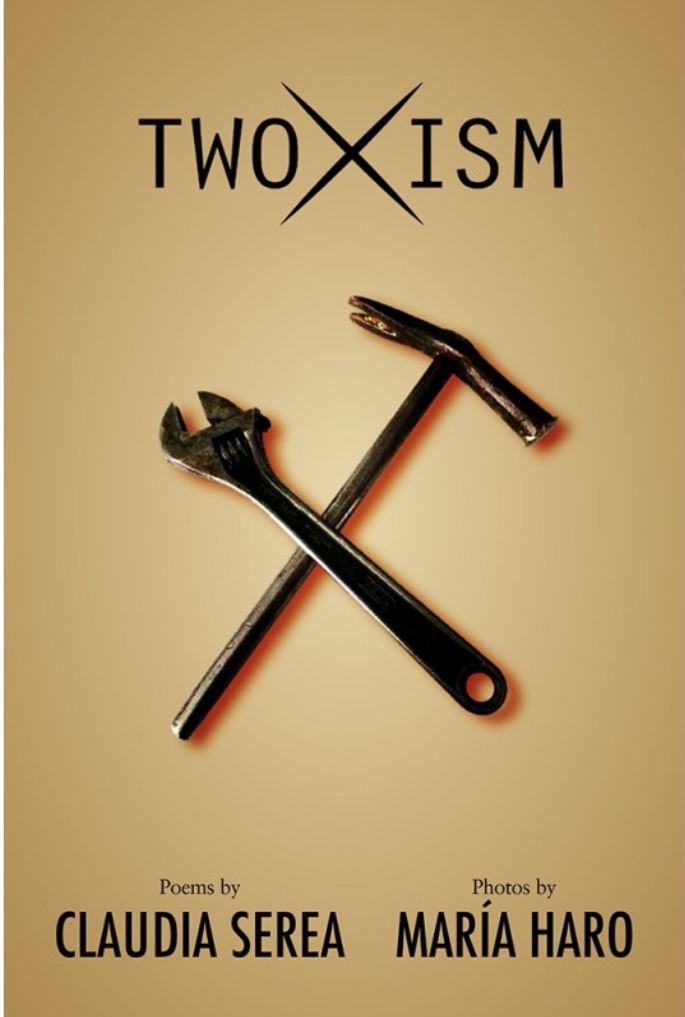TWOXISM
poems and visual art
by Claudia Serea and Maria Haro
8th House Publishing (Montreal, Canada, 2018)
6” x 9”, paperback, 112 pages ($20.00)
http://www.8thhousepublishing.com/8thHouseStore/poetry/twoxism-by-claudia-serea-maria-haro.html
Review by Tim Suermondt
With the launch of Twoxism, Claudia Serea continues her string of marvelous poetry. And this time she’s nicely abetted by the photos and artwork of Maria Haro and her visual arts compatriots. I’ll be talking about the poetry side of things, but the art does integrate itself well with the poems—it’s not a mere tack on—and has a life of its own, a twoxism indeed.
What I like most about the poems is their focus on the city and the people who live in them. I remember the great city poet David Ignatow telling a group of aspiring poets: “All of you live in the city, so where are the subways and the cockroaches? You’ve got to get them into your poems.” I’m glad to report that Serea mentions them both. Ignatow would have been proud.
And from this cityscape we branch out to love sought, love found, love lost, and love regained as much as is possible. Where would poets be without musing on love in all its manifestations? Here’s a short poem that sets the early mood:
A question for you
Tell me,
if I caught your shadow
and kissed it,
would you walk only
on the sunny side of the streets
so you wouldn’t lose
my kiss?
Even in this little poem we see some of the traits of Serea’s poetry: simplicity and lyricism with a bit of a bite, and a tiny vial of strangeness that all the best writers carry with them.
Of course, this review can’t hold all the poems I’d like to include, but here’s another poem in full that I think captures a vital part of city life:
Love is not a microphone
After the party,
when everyone goes home,
this is what’s left:
a tangle of beads,
days in a string of broken pearls
with an ampersand
at the end.
The opposite of two
is one.
The antonym of love
is not hate,
but alone.
In Two closed doors we get: “And behind which one will you wait,/eating a slice of bread,/flipping the channels, growing a beard?” From House hunting on Sundays there’s “At dawn, we wished to be/forever young/And we were.” And from Red and White “Tonight, I’m a flame/in high heels,/a locked door/you’ll open/with the purest /snow key.”
Delicious language with the city rhythms stretching out into the suburbs and beyond. And Ode to beer working its magic everywhere:
…
Because wine is pretentious
and water too plain,
and you’re humble,
and taste of grain.
…
Because your name is simple.
Beer and poetry and the lives we live with all its joys and disappointments, and often from the rubble victory does arise with love in the lead.
Claudia Serea and Maria Haro have created one wonderful Twoxism. Let’s have the poet give us the final words, from How we escaped:
…
We rode our orange scooters
into the sunset.
…
The golden woods didn’t say anything.
The golden woods were a birdcage
with its door open
and a red bird
deep inside,
singing.
About the reviewer:
Tim Suermondt is the author of four full-length collections of poems, the latest one THE WORLD DOESN’T KNOW YOU. His fifth collection JOSEPHINE BAKER SWIMMING POOL will be coming out from MadHat Press in January 2019. He has published in Poetry, Ploughshares, The Georgia Review, Prairie Schooner, Able Muse, and Plume, among many others. He lives in Cambridge with his wife, the poet Pui Ying Wong.

Recent Comments